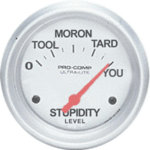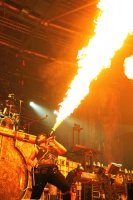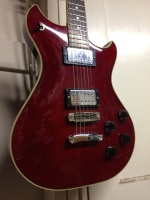Re-fret of a Pantera (or any Rosewood/Ebony neck)
+10
danagos
anaerobe
grogg
tpresley
colt933
Barry
Administrator
Racing
corsair
silence86
14 posters
Page 1 of 1
 Re-fret of a Pantera (or any Rosewood/Ebony neck)
Re-fret of a Pantera (or any Rosewood/Ebony neck)
hi,
i'm considering new frets for my pantera x390. now the problem: the sides of the fretboard are laquered and i'm afraid to damage this laquer when pulling out the old frets...how probable is this? does somebody have experience with this?
best wishes,
hans
i'm considering new frets for my pantera x390. now the problem: the sides of the fretboard are laquered and i'm afraid to damage this laquer when pulling out the old frets...how probable is this? does somebody have experience with this?
best wishes,
hans
 Re: Re-fret of a Pantera (or any Rosewood/Ebony neck)
Re: Re-fret of a Pantera (or any Rosewood/Ebony neck)
PM Racing - he re-frets at the drop of a hat and is very good at it!!  And according to his avatar, he's modest as well....
And according to his avatar, he's modest as well.... 

corsair- Senior Member
- Number of posts : 6329
Age : 65
Location : Mount Hunter, NSW, Australia
Registration date : 2008-04-08
 Re: Re-fret of a Pantera (or any Rosewood/Ebony neck)
Re: Re-fret of a Pantera (or any Rosewood/Ebony neck)
Is the board itself rosewood?

Racing- Hero, Legend, and all round good guy
- Number of posts : 194
Age : 59
Registration date : 2009-02-27
 Re: Re-fret of a Pantera (or any Rosewood/Ebony neck)
Re: Re-fret of a Pantera (or any Rosewood/Ebony neck)
thank you for your quick replies...no, it is an ebony fretboard
 Re: Re-fret of a Pantera (or any Rosewood/Ebony neck)
Re: Re-fret of a Pantera (or any Rosewood/Ebony neck)
corsair wrote:And according to his avatar, he's modest as well....
Ah yes - I did that! Wondered how long it would take for anyone to notice.

Administrator- Senior Member
- Number of posts : 142
Registration date : 2008-04-08
 Re: Re-fret of a Pantera (or any Rosewood/Ebony neck)
Re: Re-fret of a Pantera (or any Rosewood/Ebony neck)
John.
DOH!!!!
Ebony or rosewood...no matter from that respect.(As long as we´re not talking clearcoated maple its all good)
What you need is a pair of pliers that are snugly cut to get a grab of the frets really really close to the board.
I use an old pair for pulling nails that i´ve recut on the bench grinder.Works like charm and its free.
Have them handy.
Now..you need a soldering iron and a damp piece of cloth for "temperature control".
I prefer to have one of the thermostat controlled ones as that will keep the temps of the soldering iron constant.
We use heat as many frets are installed with glue,and heat is a surefire way of killing glue.
You heat each fret up until you normaly see moist just coming out at each side(which is basicaly old dirt and what have you not-yuk),then grab it firmly with the pliers and GENTLY wiggle back and forth...and out the fret comes.
This isn´t rocket science,it just takes an amount of "feel" and patience.
The trick is to keep the pressure/force uniform and NEVER rush the process.Let me stress that this is NOT a muscle bulding sport but one of being delicate to the touch.Heat will also aid a little in making the wood more pliable btw.
As long as we´re not talking fretedge bindings this is the way to do it,and the damp cloth is there to swiftly bring temps down for the novice if one to the letter see the binding starting to discolour even ever so slightly.
IF you happen to screw that part up slightly...no worries as long as the cloth was there...cause SLIGHT temp damage can always be polished out after you´re done.
DOH!!!!

Ebony or rosewood...no matter from that respect.(As long as we´re not talking clearcoated maple its all good)
What you need is a pair of pliers that are snugly cut to get a grab of the frets really really close to the board.
I use an old pair for pulling nails that i´ve recut on the bench grinder.Works like charm and its free.
Have them handy.
Now..you need a soldering iron and a damp piece of cloth for "temperature control".
I prefer to have one of the thermostat controlled ones as that will keep the temps of the soldering iron constant.
We use heat as many frets are installed with glue,and heat is a surefire way of killing glue.
You heat each fret up until you normaly see moist just coming out at each side(which is basicaly old dirt and what have you not-yuk),then grab it firmly with the pliers and GENTLY wiggle back and forth...and out the fret comes.
This isn´t rocket science,it just takes an amount of "feel" and patience.
The trick is to keep the pressure/force uniform and NEVER rush the process.Let me stress that this is NOT a muscle bulding sport but one of being delicate to the touch.Heat will also aid a little in making the wood more pliable btw.
As long as we´re not talking fretedge bindings this is the way to do it,and the damp cloth is there to swiftly bring temps down for the novice if one to the letter see the binding starting to discolour even ever so slightly.
IF you happen to screw that part up slightly...no worries as long as the cloth was there...cause SLIGHT temp damage can always be polished out after you´re done.

Racing- Hero, Legend, and all round good guy
- Number of posts : 194
Age : 59
Registration date : 2009-02-27
 Re: Re-fret of a Pantera (or any Rosewood/Ebony neck)
Re: Re-fret of a Pantera (or any Rosewood/Ebony neck)
before deciding on a refret though...they can be in a visual REALLY bad shape before that´s needed.
Bring out a pair of digital calipers.
measure the height of the worst fret from the board.
If it´s LESS than 0,8mm...yep...then my advice is to have them changed.
(I know the PLEK guys run em as low as 0,6 but i for one at least fail to see the reason)
Normaly frets for an Uncle Mat can be substituted with Dunlop 6100.
They´re about as close as you´ll get,and be prepared for a VERY different feeling when done.
The thing is that with fresh frets installed they NEED to be leveled as well as recrowned-and polished at that.
I for one have cut special radii blocks that i use as sort of fret leveling for dummies,but the real beuty is that they indeed speed the job up plentyfold.
I start out by backing the radii block with common 400grit paper after having marked each fret with an ink marker.
Then just level until i see that the ink is gone at the highs of each fret.
Then remark,and crown with a fret file until the mark juuuuuuuuuust disappears.
Then i shod the file with some 1200 grit and go at it.
A job that all in all when you get the hang of it takes about an hr or so.
When done i buff the whole board out with rubbing compound,wash thoroughly and dry with compressed air.
Then.give it a last once over with a cloth damp of acetone.
After that....almond oil by liberal amounts.
Let dry and string up.
Forget even getting any feel out of the fretboard for the first 24hrs or so.
It´ll more slippery than a hockey rink...
The following day tho....you´ll never have been that spoiled with a fretboard in your life...

Bring out a pair of digital calipers.
measure the height of the worst fret from the board.
If it´s LESS than 0,8mm...yep...then my advice is to have them changed.
(I know the PLEK guys run em as low as 0,6 but i for one at least fail to see the reason)
Normaly frets for an Uncle Mat can be substituted with Dunlop 6100.
They´re about as close as you´ll get,and be prepared for a VERY different feeling when done.
The thing is that with fresh frets installed they NEED to be leveled as well as recrowned-and polished at that.
I for one have cut special radii blocks that i use as sort of fret leveling for dummies,but the real beuty is that they indeed speed the job up plentyfold.
I start out by backing the radii block with common 400grit paper after having marked each fret with an ink marker.
Then just level until i see that the ink is gone at the highs of each fret.
Then remark,and crown with a fret file until the mark juuuuuuuuuust disappears.
Then i shod the file with some 1200 grit and go at it.
A job that all in all when you get the hang of it takes about an hr or so.
When done i buff the whole board out with rubbing compound,wash thoroughly and dry with compressed air.
Then.give it a last once over with a cloth damp of acetone.
After that....almond oil by liberal amounts.
Let dry and string up.
Forget even getting any feel out of the fretboard for the first 24hrs or so.
It´ll more slippery than a hockey rink...
The following day tho....you´ll never have been that spoiled with a fretboard in your life...

Racing- Hero, Legend, and all round good guy
- Number of posts : 194
Age : 59
Registration date : 2009-02-27
 Re: Re-fret of a Pantera (or any Rosewood/Ebony neck)
Re: Re-fret of a Pantera (or any Rosewood/Ebony neck)
Once again, Jesper delivers!!  Thanks man!! Neil, d'ya think you should stickie the re-fretting post?
Thanks man!! Neil, d'ya think you should stickie the re-fretting post? 

corsair- Senior Member
- Number of posts : 6329
Age : 65
Location : Mount Hunter, NSW, Australia
Registration date : 2008-04-08
 Re: Re-fret of a Pantera (or any Rosewood/Ebony neck)
Re: Re-fret of a Pantera (or any Rosewood/Ebony neck)
Thanx John.
In fact this whole refretting deal is regarded by some as black magic.
Of course it´s not.It´s just a matter of geometry and anal attention to detail.
For those trying this the first time out all i can advice on except from that above is to take your time.
Apart from the radii blocks for sanding BOTH the board itself when the frets are out and the frets per se i´ve made up some other very cheap tools to have around.(Sanding the fretboard ever so slightly even with one that looks fresh makes for wonders from a player POW.Have in mind that the absolute top surface of that fretboard has seen like 25yrs of service(read dirt and grease)...and the point of the matter is that SLIGHT sanding wont amount to anything from a geometry POW,while it WILL affect how the board plays.I´ll go out on a limb and state that a "corrected" 25yr old rosewood or ebony board will come out better than a new one.Mainly as the woods involved has had those 25yrs to stabilize and mature)
One is a punch/drift made out of soft aluminium.
Reason for it being soft is that it won´t marr the frets when you install them as easily.
One end of that punch has its "handle" overly large,and that end also serves as a mini mallet.
The punch is made out of what americans call 6026.Over here we call it 4212.(Which might translate for our german friend here to DIN?)
This whole thing with bending frets...well,it´s easier than you think.Fret material is rather soft tbh.(Seing it´s steel)
Just grab each fret with the pair of pliers mentioned above at the prong of one end and form my excerting finger pressure to bend it.
Easy does it,and you move the pliers along the lenght of the prong as you go.
I always "overbend" the fret ever so slightly as that will seat it more neatly as i GENTLY drive it home with the aluminium drift and a jewelers hammer.
At this point it is absolutely essential to support the guitar neck by some means.
Me,i´ve built a simple guitar bench from a scrap cupboard and foddered it with baffle material for speakers using common spray glue.
The "neck" end has a cutout to place the guitar.I normaly support the neck for these jobs with one of those dirt cheap cork sanding blocks that can be had at any auto retail store.
Upon install i use common two comp epoxy by MINUTE amounts into each fretcut of the board.
Have in mind,even a tooth pick can be to cumbersome as a tool here,and keep a rag and acetone handy to wipe off any excess epoxy right then and there.
As the epoxy indeed hardens i never mix more than is needed to install 3 or 4 frets at a time.
With all the frets seated you leave the board be for approx 24hrs.
That´ll give the epoxy ample time to harden.
After that...read above.
Then it works the same way as when you "just" level frets cause they´re worn(without replacing them)
Here´s a couple of things to have in mind....
First of all,apart from the punch i also made a small,very simple,aluminium "anvil" that holds a dial indicator.
It´s a dirt cheap russian POS that has a stroke of a mere 2mm...
The thing is that with my sanded and leveled fretboard i can use that for reference,and by placing the anvil over one pair of frets i get a direct readout in 1/100mm as far as any fret height difference.
This comes into play when you level the frets.
It is IMPERATIVE to adjust the trussrod. You do so BEFORE doing ANYTHING else.
You do so sans string obviously,and adjust by leveling with your eye along the board until completely straight.
Trust your eye here,cause it is capable of detecting differences in redicolously small amounts.
Then...read above.
The thing is that adjusting the trussrod for MOST guitars will affect the bow of the neck down to the 12th fret something like that.
(Only ones that don´t work like that is those that have their truss rod adjustment from the body side of the guitar)
From the 12th down towards the neck pup you need to cut in what´s known as slope.
Again an excersize in geometry,and i´ll not go into why as it is obvious if you think about it a little.
This is where this little dial indicator comes into play,cause it makes a swift job out of telling how much slope you´ve got.
(This can also be done with the digital calipers,it just takes longer.)

The dial indicator and the drift/punch.
I normaly end up cutting approx 5-7/100mm slope into the neck from the trussrod action point downwards.
This is for regular 10-46 strings.
If i can help out by answering any other Qs,shoot away when it comes to this.
What´s more...DON`T be afraid to pull it off if you ain´t all thumbs.
It really ISN`T all that much of a deal.
I guarantee.
In fact this whole refretting deal is regarded by some as black magic.
Of course it´s not.It´s just a matter of geometry and anal attention to detail.
For those trying this the first time out all i can advice on except from that above is to take your time.
Apart from the radii blocks for sanding BOTH the board itself when the frets are out and the frets per se i´ve made up some other very cheap tools to have around.(Sanding the fretboard ever so slightly even with one that looks fresh makes for wonders from a player POW.Have in mind that the absolute top surface of that fretboard has seen like 25yrs of service(read dirt and grease)...and the point of the matter is that SLIGHT sanding wont amount to anything from a geometry POW,while it WILL affect how the board plays.I´ll go out on a limb and state that a "corrected" 25yr old rosewood or ebony board will come out better than a new one.Mainly as the woods involved has had those 25yrs to stabilize and mature)
One is a punch/drift made out of soft aluminium.
Reason for it being soft is that it won´t marr the frets when you install them as easily.
One end of that punch has its "handle" overly large,and that end also serves as a mini mallet.
The punch is made out of what americans call 6026.Over here we call it 4212.(Which might translate for our german friend here to DIN?)
This whole thing with bending frets...well,it´s easier than you think.Fret material is rather soft tbh.(Seing it´s steel)
Just grab each fret with the pair of pliers mentioned above at the prong of one end and form my excerting finger pressure to bend it.
Easy does it,and you move the pliers along the lenght of the prong as you go.
I always "overbend" the fret ever so slightly as that will seat it more neatly as i GENTLY drive it home with the aluminium drift and a jewelers hammer.
At this point it is absolutely essential to support the guitar neck by some means.
Me,i´ve built a simple guitar bench from a scrap cupboard and foddered it with baffle material for speakers using common spray glue.
The "neck" end has a cutout to place the guitar.I normaly support the neck for these jobs with one of those dirt cheap cork sanding blocks that can be had at any auto retail store.
Upon install i use common two comp epoxy by MINUTE amounts into each fretcut of the board.
Have in mind,even a tooth pick can be to cumbersome as a tool here,and keep a rag and acetone handy to wipe off any excess epoxy right then and there.
As the epoxy indeed hardens i never mix more than is needed to install 3 or 4 frets at a time.
With all the frets seated you leave the board be for approx 24hrs.
That´ll give the epoxy ample time to harden.
After that...read above.
Then it works the same way as when you "just" level frets cause they´re worn(without replacing them)
Here´s a couple of things to have in mind....
First of all,apart from the punch i also made a small,very simple,aluminium "anvil" that holds a dial indicator.
It´s a dirt cheap russian POS that has a stroke of a mere 2mm...
The thing is that with my sanded and leveled fretboard i can use that for reference,and by placing the anvil over one pair of frets i get a direct readout in 1/100mm as far as any fret height difference.
This comes into play when you level the frets.
It is IMPERATIVE to adjust the trussrod. You do so BEFORE doing ANYTHING else.
You do so sans string obviously,and adjust by leveling with your eye along the board until completely straight.
Trust your eye here,cause it is capable of detecting differences in redicolously small amounts.
Then...read above.
The thing is that adjusting the trussrod for MOST guitars will affect the bow of the neck down to the 12th fret something like that.
(Only ones that don´t work like that is those that have their truss rod adjustment from the body side of the guitar)
From the 12th down towards the neck pup you need to cut in what´s known as slope.
Again an excersize in geometry,and i´ll not go into why as it is obvious if you think about it a little.
This is where this little dial indicator comes into play,cause it makes a swift job out of telling how much slope you´ve got.
(This can also be done with the digital calipers,it just takes longer.)

The dial indicator and the drift/punch.
I normaly end up cutting approx 5-7/100mm slope into the neck from the trussrod action point downwards.
This is for regular 10-46 strings.
If i can help out by answering any other Qs,shoot away when it comes to this.
What´s more...DON`T be afraid to pull it off if you ain´t all thumbs.
It really ISN`T all that much of a deal.
I guarantee.

Racing- Hero, Legend, and all round good guy
- Number of posts : 194
Age : 59
Registration date : 2009-02-27
 Re: Re-fret of a Pantera (or any Rosewood/Ebony neck)
Re: Re-fret of a Pantera (or any Rosewood/Ebony neck)
Jesper, you are an extraordinarily generous man!
Thank you for taking the time to share your experience and knowledge with us!
I've learned so much from reading your many other posts on refinishing and it's given me the courage to do things I'd never even consider trying before. I'm currently restoring and refinishing a battered up old Vantage AV310 which was in pitiful shape when I got it. Today I put on a second coat of colour and tung oil, and I found myself grinning at how great it looked. I have you (and Frenchy) to thank for the guidance and encouragement.
One day...soon...fret job (?)
Thank you for taking the time to share your experience and knowledge with us!
I've learned so much from reading your many other posts on refinishing and it's given me the courage to do things I'd never even consider trying before. I'm currently restoring and refinishing a battered up old Vantage AV310 which was in pitiful shape when I got it. Today I put on a second coat of colour and tung oil, and I found myself grinning at how great it looked. I have you (and Frenchy) to thank for the guidance and encouragement.
One day...soon...fret job (?)
_________________
"A little song. A little dance. A little seltzer down your pants." -Chuckles the Clown

GUITARS : https://legend.barryeames.com
MUSIC/PIX/VIDEOS: https://getback.barryeames.com (including Spectrum ST)
 Re: Re-fret of a Pantera (or any Rosewood/Ebony neck)
Re: Re-fret of a Pantera (or any Rosewood/Ebony neck)
thank you so much for your help...i will tackle that mission soon...
 Re: Re-fret of a Pantera (or any Rosewood/Ebony neck)
Re: Re-fret of a Pantera (or any Rosewood/Ebony neck)
Racing wrote:Normaly frets for an Uncle Mat can be substituted with Dunlop 6100.
They´re about as close as you´ll get,and be prepared for a VERY different feeling when done.
As big as 6100s are the Uncle Mat frets are bigger - the biggest I have ever seen.

colt933- Senior Member
- Number of posts : 583
Registration date : 2008-04-08
 Re: Re-fret of a Pantera (or any Rosewood/Ebony neck)
Re: Re-fret of a Pantera (or any Rosewood/Ebony neck)
No offense,but not the ones i´ve been in contact with.
About 2.8 wide and 1.4 high if fresh,and as most of these guitars are of age those 1.4 are more often than not around .8 to 1.0.
Hence why i state there will be a rather large difference in feel as the guitar has been refretted.
The 6100 are jumbo frets by any measure.
About 2.8 wide and 1.4 high if fresh,and as most of these guitars are of age those 1.4 are more often than not around .8 to 1.0.
Hence why i state there will be a rather large difference in feel as the guitar has been refretted.
The 6100 are jumbo frets by any measure.

Racing- Hero, Legend, and all round good guy
- Number of posts : 194
Age : 59
Registration date : 2009-02-27
 Re: Re-fret of a Pantera (or any Rosewood/Ebony neck)
Re: Re-fret of a Pantera (or any Rosewood/Ebony neck)
Racing wrote:No offense,but not the ones i´ve been in contact with.
About 2.8 wide and 1.4 high if fresh,and as most of these guitars are of age those 1.4 are more often than not around .8 to 1.0.
Hence why i state there will be a rather large difference in feel as the guitar has been refretted.
The 6100 are jumbo frets by any measure.
I should have clarified: the frets on the Pantera X-300 and X-390 are the biggest frets I have ever seen - bigger than Dunlop 6100.
The frets on other Westone models that I have owned, including rainbows, prestiges, and thunders, are not this big.

colt933- Senior Member
- Number of posts : 583
Registration date : 2008-04-08
 Re: Re-fret of a Pantera (or any Rosewood/Ebony neck)
Re: Re-fret of a Pantera (or any Rosewood/Ebony neck)
Name of the game was refret.
In this case a Yamaki built -80 vintage Daion Power X i just bought that had been refretted by some amatuer that hadn´t understood what goes into it....

Start by applying heat with the soldering pen.
To speed the process up,and to equalize how the heat spreads over the fret i ad a little solder.

Then for the pliers.
Those have been recut by me on the bench grinder to grip as close to the fret board as they can.
Caution is adviced here,as brute force will make the fretboard splinter-altho the heat put in help you in that it makes the wood more pliable.
Further,the heat kills any and all glue present-which is downright imperative.

The less than satisfactory job someone before me had pulled.
It sure as hell helps if the frets indeed cover the ENTIRE fretboard!

I then level the fretboard.
Wear and tear takes its toll over 30yrs of course,but what´s worse is that our aformentioned hero had obviously used to much heat...which can be seen on the bindings discolouration.
The darker spots you see is where the board is uneven,where the wood have sunk in.
So...this is about half ways in other words.
When doing this i normaly start out with 80 grit to coarsly shape the board(in this case of 10" radii),and follow up by going finer and finre grit until i get a luster out of the board-albeit at that stage still being a little matte to the looks.
At this stage i´m VERY anal about cleaning the fretcutouts out from debris,old dirt and crud.
The idea here is to leave the frets the room needed to be driven into place without affecting the wood itself to any larger degree than needed.
I happen to use a recut jewelers screwdriver for this that fits into cutout sort of like a knife.

Then we kind of reach the turnaround point.
I cut and mod 3 pcs of frets at a time to get a mellow workpace.
I for one use two comp regular epoxy to secure the frets,and i mix the amount to seat three frets at a time.
Point being that the epoxy hardens after that.
I cut each fret roughly to length,and then cut the prong of it to fit the cutout in the board.
Level the prong part flat with a needle file,and then rough shape each fret with the above pair of pliers.
Epoxy in the cutout,and i drive the fret home with the punch/drift in the pic to seat it.
Byt doing so i also form the fret to follow the fretboard,working my way up the fretboard...3 at a time..
As you can see i deliberatly make the frets to long.
This i use a pair of sidecutter to trim that i´ve modded to cut as close to the neck as possible.
With this done...i start forming the fretedges with a common needle file,which actualy takes less time than you´d think.
This done....it time for the next stage,and that it leveling the fret vs each other with the same radii block i used to level the board itself.
....to be continued...
In this case a Yamaki built -80 vintage Daion Power X i just bought that had been refretted by some amatuer that hadn´t understood what goes into it....
Start by applying heat with the soldering pen.
To speed the process up,and to equalize how the heat spreads over the fret i ad a little solder.
Then for the pliers.
Those have been recut by me on the bench grinder to grip as close to the fret board as they can.
Caution is adviced here,as brute force will make the fretboard splinter-altho the heat put in help you in that it makes the wood more pliable.
Further,the heat kills any and all glue present-which is downright imperative.
The less than satisfactory job someone before me had pulled.
It sure as hell helps if the frets indeed cover the ENTIRE fretboard!

I then level the fretboard.
Wear and tear takes its toll over 30yrs of course,but what´s worse is that our aformentioned hero had obviously used to much heat...which can be seen on the bindings discolouration.
The darker spots you see is where the board is uneven,where the wood have sunk in.
So...this is about half ways in other words.
When doing this i normaly start out with 80 grit to coarsly shape the board(in this case of 10" radii),and follow up by going finer and finre grit until i get a luster out of the board-albeit at that stage still being a little matte to the looks.
At this stage i´m VERY anal about cleaning the fretcutouts out from debris,old dirt and crud.
The idea here is to leave the frets the room needed to be driven into place without affecting the wood itself to any larger degree than needed.
I happen to use a recut jewelers screwdriver for this that fits into cutout sort of like a knife.
Then we kind of reach the turnaround point.
I cut and mod 3 pcs of frets at a time to get a mellow workpace.
I for one use two comp regular epoxy to secure the frets,and i mix the amount to seat three frets at a time.
Point being that the epoxy hardens after that.
I cut each fret roughly to length,and then cut the prong of it to fit the cutout in the board.
Level the prong part flat with a needle file,and then rough shape each fret with the above pair of pliers.
Epoxy in the cutout,and i drive the fret home with the punch/drift in the pic to seat it.
Byt doing so i also form the fret to follow the fretboard,working my way up the fretboard...3 at a time..
As you can see i deliberatly make the frets to long.
This i use a pair of sidecutter to trim that i´ve modded to cut as close to the neck as possible.
With this done...i start forming the fretedges with a common needle file,which actualy takes less time than you´d think.
This done....it time for the next stage,and that it leveling the fret vs each other with the same radii block i used to level the board itself.
....to be continued...

Racing- Hero, Legend, and all round good guy
- Number of posts : 194
Age : 59
Registration date : 2009-02-27
 Re: Re-fret of a Pantera (or any Rosewood/Ebony neck)
Re: Re-fret of a Pantera (or any Rosewood/Ebony neck)
As the fresh frets have taken a set i dress the fret ends with a needle file.
This is where i also adress the slope/angle of the fretends,and..basicaly pick your poison as far as that goes.
Some like more,some like less.
With that done next up is the leveling of the frets and recrowning.

I mark each fret with a black marker pen,and bring out my homebrew radii blocks once again.
This time shod with 400 grit.

I sand away until the black at the tops of the frets is all gone.
Now..this will indeed induce a "flat" at the top of each fret...which we DON`T want...
So....
Again...black felt marker...

..and out this little friend comes.
I file each and every fret...

..and keep a close eye how the file works across the fret.
Keep doing so until absolute minute amounts of the black colour remains.
We´re talking hair thin here-and then some.

Again black felt marker,and i attack the frets with the file shod with 1200 grit.
This polishes the frets to what you see here.
You can also clearly see what good the initial job did as far the board itself.

I then oil the board...and strung and oiled up it looks like this.
The board will soak up the oil to a degree for the first couple of days,and as such turn brighter to the look.
As you can see the sanding of the board also got rid of most of the discolouration of the binding.
Ie;no harm no foul.
In the case of this particular axe i also spent much time on coloursanding and buffing with rubbing compunds.
Some previous owner had thought it was a good idea to spraypaint it with black paint and god knows what else..
Sure..it still carries its fair share of dings,and those will stay as the axe after all IS 30yrs old(it´s an -80 vintage)
Had some luck and found a fresh set of pupframes as the old ones were shot,and as is it now needs a new top nut and a TRC.
Something i´ll handle down the line.


This is where i also adress the slope/angle of the fretends,and..basicaly pick your poison as far as that goes.
Some like more,some like less.
With that done next up is the leveling of the frets and recrowning.
I mark each fret with a black marker pen,and bring out my homebrew radii blocks once again.
This time shod with 400 grit.
I sand away until the black at the tops of the frets is all gone.
Now..this will indeed induce a "flat" at the top of each fret...which we DON`T want...
So....
Again...black felt marker...
..and out this little friend comes.
I file each and every fret...
..and keep a close eye how the file works across the fret.
Keep doing so until absolute minute amounts of the black colour remains.
We´re talking hair thin here-and then some.
Again black felt marker,and i attack the frets with the file shod with 1200 grit.
This polishes the frets to what you see here.
You can also clearly see what good the initial job did as far the board itself.
I then oil the board...and strung and oiled up it looks like this.
The board will soak up the oil to a degree for the first couple of days,and as such turn brighter to the look.
As you can see the sanding of the board also got rid of most of the discolouration of the binding.
Ie;no harm no foul.
In the case of this particular axe i also spent much time on coloursanding and buffing with rubbing compunds.
Some previous owner had thought it was a good idea to spraypaint it with black paint and god knows what else..
Sure..it still carries its fair share of dings,and those will stay as the axe after all IS 30yrs old(it´s an -80 vintage)
Had some luck and found a fresh set of pupframes as the old ones were shot,and as is it now needs a new top nut and a TRC.
Something i´ll handle down the line.

Racing- Hero, Legend, and all round good guy
- Number of posts : 194
Age : 59
Registration date : 2009-02-27
 Re: Re-fret of a Pantera (or any Rosewood/Ebony neck)
Re: Re-fret of a Pantera (or any Rosewood/Ebony neck)
Fantastic job Jesper! You make it look all too easy. 
I can see myself getting into a lot of trouble trying to do this.
Perhaps...one day...I'll find an old beater guitar and practice on it.
I can see myself getting into a lot of trouble trying to do this.
Perhaps...one day...I'll find an old beater guitar and practice on it.
_________________
"A little song. A little dance. A little seltzer down your pants." -Chuckles the Clown

GUITARS : https://legend.barryeames.com
MUSIC/PIX/VIDEOS: https://getback.barryeames.com (including Spectrum ST)
 Re: Re-fret of a Pantera (or any Rosewood/Ebony neck)
Re: Re-fret of a Pantera (or any Rosewood/Ebony neck)
What i want to get across Barry is that there IS no magic involved.
Just work.
I´ve had it up to here with all that "black magic mojo crap",so hence why i try and explain what goes into this.
Just work.
I´ve had it up to here with all that "black magic mojo crap",so hence why i try and explain what goes into this.

Racing- Hero, Legend, and all round good guy
- Number of posts : 194
Age : 59
Registration date : 2009-02-27
 Re: Re-fret of a Pantera (or any Rosewood/Ebony neck)
Re: Re-fret of a Pantera (or any Rosewood/Ebony neck)
just wanted you to know that i pulled the teeth of the pantera this weekend...it was easier than expected. i can't find the data cable of my camera, but i'll post pics soon. i ordered fretwire that is 3 mm wide and 1,5 high...i guess they will fit...
 Re: Re-fret of a Pantera (or any Rosewood/Ebony neck)
Re: Re-fret of a Pantera (or any Rosewood/Ebony neck)
Great stuff! Love to see some pix when ya got 'em.
I have a couple of Mats (including my latest one) that really need some work. I dunno if I'd be able to tackle it with my current set up, or lack of it, but I'm glad you were.
I have a couple of Mats (including my latest one) that really need some work. I dunno if I'd be able to tackle it with my current set up, or lack of it, but I'm glad you were.
_________________
"A little song. A little dance. A little seltzer down your pants." -Chuckles the Clown

GUITARS : https://legend.barryeames.com
MUSIC/PIX/VIDEOS: https://getback.barryeames.com (including Spectrum ST)
 Re: Re-fret of a Pantera (or any Rosewood/Ebony neck)
Re: Re-fret of a Pantera (or any Rosewood/Ebony neck)
Cool!
If you ordered it bulk three strips of one foot will suffice and then some.
Let me know if you get caught on anything and i´ll try to help out.
If you ordered it bulk three strips of one foot will suffice and then some.
Let me know if you get caught on anything and i´ll try to help out.

Racing- Hero, Legend, and all round good guy
- Number of posts : 194
Age : 59
Registration date : 2009-02-27
 Re: Re-fret of a Pantera (or any Rosewood/Ebony neck)
Re: Re-fret of a Pantera (or any Rosewood/Ebony neck)
Hi Jesper, I know you made brief reference to Maple fret boards at the beginning of this post, but I can't recall if you or anyone else has discussed the problems of re-fretting that type of wood. I assume the main difficulty is that more force is needed to remove the frets and it splits easily??
If so how do you approach it?
If so how do you approach it?
_________________
"A little song. A little dance. A little seltzer down your pants." -Chuckles the Clown

GUITARS : https://legend.barryeames.com
MUSIC/PIX/VIDEOS: https://getback.barryeames.com (including Spectrum ST)
 Re: Re-fret of a Pantera (or any Rosewood/Ebony neck)
Re: Re-fret of a Pantera (or any Rosewood/Ebony neck)
Nah.
Not really.
The culprit with maple necks is the top coat.
As most maple necks are painted complete with frets and all it´s good practice to use a razorblade to cut the paint across the lenght of each fret before pulling them.
Not really.
The culprit with maple necks is the top coat.
As most maple necks are painted complete with frets and all it´s good practice to use a razorblade to cut the paint across the lenght of each fret before pulling them.
Last edited by Racing on Mon Dec 21, 2009 12:51 am; edited 1 time in total

Racing- Hero, Legend, and all round good guy
- Number of posts : 194
Age : 59
Registration date : 2009-02-27
 Re: Re-fret of a Pantera (or any Rosewood/Ebony neck)
Re: Re-fret of a Pantera (or any Rosewood/Ebony neck)
Oh. 
_________________
"A little song. A little dance. A little seltzer down your pants." -Chuckles the Clown

GUITARS : https://legend.barryeames.com
MUSIC/PIX/VIDEOS: https://getback.barryeames.com (including Spectrum ST)
 Re: Re-fret of a Pantera (or any Rosewood/Ebony neck)
Re: Re-fret of a Pantera (or any Rosewood/Ebony neck)
Jesper, you are the MAN! Fantastic info for everyone!
I've used the Don Teeter method for refretting on some of the Pantera models with the Ebony necks. Works great but much more complicated than your description.
One thing that you have to watch out for is the over-action of the truss system. I've seen some guys separate the fingerboard from the neck because, when pulling the strings AND the frets, the fingerboard is what is really providing positive tension - the neck tries to reverse bow and a conflict torque applies. When the new frets are applied - fatter tangs, the fingerboard is actually forced in reverse torque due to the "wedging" action of the tangs. Result, fingerboad pops loose in spots. Fix? Loosen the truss a little at a time to prevent over reverse bowing the neck.
Great post. Now I know where to get a decent fret job in the future!
Tom
I've used the Don Teeter method for refretting on some of the Pantera models with the Ebony necks. Works great but much more complicated than your description.
One thing that you have to watch out for is the over-action of the truss system. I've seen some guys separate the fingerboard from the neck because, when pulling the strings AND the frets, the fingerboard is what is really providing positive tension - the neck tries to reverse bow and a conflict torque applies. When the new frets are applied - fatter tangs, the fingerboard is actually forced in reverse torque due to the "wedging" action of the tangs. Result, fingerboad pops loose in spots. Fix? Loosen the truss a little at a time to prevent over reverse bowing the neck.
Great post. Now I know where to get a decent fret job in the future!
Tom

tpresley- Registered Member
- Number of posts : 18
Age : 74
Location : Huntingburg, IN
Registration date : 2010-01-28
 Re: Re-fret of a Pantera (or any Rosewood/Ebony neck)
Re: Re-fret of a Pantera (or any Rosewood/Ebony neck)
High praise indeed! And well deserved.tpresley wrote:Jesper, you are the MAN! Fantastic info for everyone!...
Jesper is held in very high regard for both his talent and his generous contributions both here and the Matsumoku forum.
_________________
"A little song. A little dance. A little seltzer down your pants." -Chuckles the Clown

GUITARS : https://legend.barryeames.com
MUSIC/PIX/VIDEOS: https://getback.barryeames.com (including Spectrum ST)
 Re: Re-fret of a Pantera (or any Rosewood/Ebony neck)
Re: Re-fret of a Pantera (or any Rosewood/Ebony neck)
Jesper,
Im amazed you crowned the frets with a flat file and didnt damage the wood. Your technique must be very precise. Nice job..
Im amazed you crowned the frets with a flat file and didnt damage the wood. Your technique must be very precise. Nice job..

grogg- Financial supporter
- Number of posts : 1094
Location : Cardiff
Registration date : 2008-11-28
 Re: Re-fret of a Pantera (or any Rosewood/Ebony neck)
Re: Re-fret of a Pantera (or any Rosewood/Ebony neck)
Glad these notes have achieved sticky status... tremendous information.

anaerobe- Senior Member
- Number of posts : 497
Age : 62
Location : ,location, location.
Registration date : 2009-05-05
 Re: Re-fret of a Pantera (or any Rosewood/Ebony neck)
Re: Re-fret of a Pantera (or any Rosewood/Ebony neck)
Grogg.
No.
I use a fretfile
A fretfile has a radius cut in on respective short side.
These come in various forms and diameters.
Most common ones for what we do here is 1,2 and 3mm.
Normaly refered to as small,medium and large.
The one i by far use the most is the mediums.
When done with the recrowning i dress the file with very fine grit emery.
Normaly like 1200,but then on the other hand i also work the entire fretboard with rubbing compound and a buffer after that-Ie,the rubbing works like an approx 2000-3000 grit.
End result is frets that are so smooth you´ve never experienced anything like it.
I guarantee.
No.
I use a fretfile
A fretfile has a radius cut in on respective short side.
These come in various forms and diameters.
Most common ones for what we do here is 1,2 and 3mm.
Normaly refered to as small,medium and large.
The one i by far use the most is the mediums.
When done with the recrowning i dress the file with very fine grit emery.
Normaly like 1200,but then on the other hand i also work the entire fretboard with rubbing compound and a buffer after that-Ie,the rubbing works like an approx 2000-3000 grit.
End result is frets that are so smooth you´ve never experienced anything like it.
I guarantee.

Racing- Hero, Legend, and all round good guy
- Number of posts : 194
Age : 59
Registration date : 2009-02-27
 Re: Re-fret of a Pantera (or any Rosewood/Ebony neck)
Re: Re-fret of a Pantera (or any Rosewood/Ebony neck)
Racing that was an inspiring series of posts, I'm impressed with your skills & generosity.
I stayed up WAY later than intended reading over your comments and studying the pics.
Thanks so much,
dan
I stayed up WAY later than intended reading over your comments and studying the pics.
Thanks so much,
dan

danagos- Westone Nut
- Number of posts : 57
Age : 75
Location : Wayne, NJ USA
Registration date : 2010-08-20
 Re: Re-fret of a Pantera (or any Rosewood/Ebony neck)
Re: Re-fret of a Pantera (or any Rosewood/Ebony neck)
Jesper,
Can you briefly explain the theory behind the slope on the pickup side of the 12th fret, that you referred to above. I'm trying to visualize this and it ain't happening. I think truing this up on my prestige 150 may take care of the fret buzz that's ailing her. Thanks for your informational investment in here!
chris
Can you briefly explain the theory behind the slope on the pickup side of the 12th fret, that you referred to above. I'm trying to visualize this and it ain't happening. I think truing this up on my prestige 150 may take care of the fret buzz that's ailing her. Thanks for your informational investment in here!
chris

cnevins- Westone Nut
- Number of posts : 81
Age : 53
Location : Michigan, USA
Registration date : 2008-11-22
 Re: Re-fret of a Pantera (or any Rosewood/Ebony neck)
Re: Re-fret of a Pantera (or any Rosewood/Ebony neck)
I´d be happy to.
It all comes down to geometry and the basic understanding of string oscillation.
To make you understand that,regard the guitar fretboard and stringpack from the player POW so to say. From the side for lack of better description.
Strings are suspended at each end-one being the upper nut and the other being the bridge saddles.
Now,no matter how and where you strike the string the utmost margin of movement will be a given specific point just shy of halvways as far as oscillation goes.
This will in turn be the point of need for greatest leeway not to create fretbuzz,and this is what we compensate for by cutting slope.
That coupled with the fact that most guitars can not be adjusted down there as the trussrod anchor sits in such a position that trussrod adjustment doesn´t alter neck movement in those places.
Easy as that.
Likewise.
High E will require less leeway than low E due to oscillation. Also rather easy to grasp i guess.(Low E "moves around" more than high E as a matter of inherent physics)
It is to the point where you COULD cut the low end strings from say fret 14/15 or so and up harder/lower than the high E side...but mostly you don´t as a mere well done fret level job will let you get the stringpack as low as anybody´d want it anyways.(Ie;cut a "twist" into the upper frets)
Some might reason that they don´t fool around with low stringpack heights so why bother.
Weeeeeeell....
Even so the truth of the matter is that fretbuzz,which is really mechanical contact between the string and fret,will happen WAY before the human ear can hear it and as such hinder string performance. It will affect tone as well as sustain. As such a fretlevel job will make wonders for tone and sustain EVEN IF you like me use a medium height stringpack when playing-and this to the point where it is an eye opener.
It all comes down to geometry and the basic understanding of string oscillation.
To make you understand that,regard the guitar fretboard and stringpack from the player POW so to say. From the side for lack of better description.
Strings are suspended at each end-one being the upper nut and the other being the bridge saddles.
Now,no matter how and where you strike the string the utmost margin of movement will be a given specific point just shy of halvways as far as oscillation goes.
This will in turn be the point of need for greatest leeway not to create fretbuzz,and this is what we compensate for by cutting slope.
That coupled with the fact that most guitars can not be adjusted down there as the trussrod anchor sits in such a position that trussrod adjustment doesn´t alter neck movement in those places.
Easy as that.
Likewise.
High E will require less leeway than low E due to oscillation. Also rather easy to grasp i guess.(Low E "moves around" more than high E as a matter of inherent physics)
It is to the point where you COULD cut the low end strings from say fret 14/15 or so and up harder/lower than the high E side...but mostly you don´t as a mere well done fret level job will let you get the stringpack as low as anybody´d want it anyways.(Ie;cut a "twist" into the upper frets)
Some might reason that they don´t fool around with low stringpack heights so why bother.
Weeeeeeell....
Even so the truth of the matter is that fretbuzz,which is really mechanical contact between the string and fret,will happen WAY before the human ear can hear it and as such hinder string performance. It will affect tone as well as sustain. As such a fretlevel job will make wonders for tone and sustain EVEN IF you like me use a medium height stringpack when playing-and this to the point where it is an eye opener.

Racing- Hero, Legend, and all round good guy
- Number of posts : 194
Age : 59
Registration date : 2009-02-27
 Re: Re-fret of a Pantera (or any Rosewood/Ebony neck)
Re: Re-fret of a Pantera (or any Rosewood/Ebony neck)
Jesper-
Yes that makes total sense! Thank you for sharing your wealth of knowledge with all of us. This treasure trove of information will be a valuable reference for those fortunate enough to happen upon it. Thanks again!
Chris
Yes that makes total sense! Thank you for sharing your wealth of knowledge with all of us. This treasure trove of information will be a valuable reference for those fortunate enough to happen upon it. Thanks again!
Chris

cnevins- Westone Nut
- Number of posts : 81
Age : 53
Location : Michigan, USA
Registration date : 2008-11-22
 Re: Re-fret of a Pantera (or any Rosewood/Ebony neck)
Re: Re-fret of a Pantera (or any Rosewood/Ebony neck)
Thank you for an excellent thread.
I started the re-fret of my 86 Thunder 1 this weekend.
Having pulled the frets, sanded the fingerboard, inserted the new frets I can state the best single purchase for the job was my fret cleaning saw.
Got this one: http://www.tonetechluthiersupplies.co.uk/Tools-for-Guitar-Making/Luthier-Files-Knives-and-Saws/919-Fret-Slot-Cleaning-Saw-Single/flypage-ask.tpl.html
I'm not affiliated with Tonetech just a satifsfied customer before anyone asks and whilst this is expensive for a single tool, the fret slots were like new when I had finished using this
Regarding the re-fret, it has taken me over a year to build up the courage to do it, but as the Thunder has been with me for 26 years, I wanted to be the one to look after her (how lame ) and learn to maintain her myself. So far so good.
) and learn to maintain her myself. So far so good.
Great thread and I'll let you know how it turns out. Just need to dress and level the frets now.
Cheers
Mark
I started the re-fret of my 86 Thunder 1 this weekend.
Having pulled the frets, sanded the fingerboard, inserted the new frets I can state the best single purchase for the job was my fret cleaning saw.
Got this one: http://www.tonetechluthiersupplies.co.uk/Tools-for-Guitar-Making/Luthier-Files-Knives-and-Saws/919-Fret-Slot-Cleaning-Saw-Single/flypage-ask.tpl.html
I'm not affiliated with Tonetech just a satifsfied customer before anyone asks and whilst this is expensive for a single tool, the fret slots were like new when I had finished using this
Regarding the re-fret, it has taken me over a year to build up the courage to do it, but as the Thunder has been with me for 26 years, I wanted to be the one to look after her (how lame
Great thread and I'll let you know how it turns out. Just need to dress and level the frets now.
Cheers
Mark

marktigere1- Registered Member
- Number of posts : 12
Location : Suffolk, UK
Registration date : 2010-04-07
 Re: Re-fret of a Pantera (or any Rosewood/Ebony neck)
Re: Re-fret of a Pantera (or any Rosewood/Ebony neck)
Finished this weekend 
Many thanks for the thread which gave me the confidence to do the job.
Things I learnt:
1. To take my time.
2. To use a fret cleaning saw. Did a superb job of cleaning out the fret slots.
3. To remember that the crowning file works in one direction only and clean out the teeth after each fret. This prevented scoring the new fret with swarf stuck in the teeth.
4. I cut the slope into the frets rather than the fingerboard. My only reason being I am an amateur and putting new frets in is easier than sorting out the fingerboard if I stuff it up. Works great with no fret buzzing
5. You don't need expensive tools. My fret clippers were a ground flat pair of cheap wire cutters. Cut flush with the edge of the finger board and did the job well.
6. I used a few walnuts to oil the fingerboard. Came up like new, well pleased with the finish and I got to eat the remaining nuts (don't eat the ones being used on the fingerboard )
)
So again, many thanks for all the information which I followed to the letter (except cutting in the slope which I did on the frets). My Thunder 1 plays as good as new.
Cheers
Mark
Many thanks for the thread which gave me the confidence to do the job.
Things I learnt:
1. To take my time.
2. To use a fret cleaning saw. Did a superb job of cleaning out the fret slots.
3. To remember that the crowning file works in one direction only and clean out the teeth after each fret. This prevented scoring the new fret with swarf stuck in the teeth.
4. I cut the slope into the frets rather than the fingerboard. My only reason being I am an amateur and putting new frets in is easier than sorting out the fingerboard if I stuff it up. Works great with no fret buzzing
5. You don't need expensive tools. My fret clippers were a ground flat pair of cheap wire cutters. Cut flush with the edge of the finger board and did the job well.
6. I used a few walnuts to oil the fingerboard. Came up like new, well pleased with the finish and I got to eat the remaining nuts (don't eat the ones being used on the fingerboard
So again, many thanks for all the information which I followed to the letter (except cutting in the slope which I did on the frets). My Thunder 1 plays as good as new.
Cheers
Mark

marktigere1- Registered Member
- Number of posts : 12
Location : Suffolk, UK
Registration date : 2010-04-07
 Re: Re-fret of a Pantera (or any Rosewood/Ebony neck)
Re: Re-fret of a Pantera (or any Rosewood/Ebony neck)
Terrific Mark!
Yessir, our favourite Viking is the dog's bollox when it comes to this stuff...he's also a wiz with old tube amps in case you're leaning that way too!
Hey, now how about some pix?
Yessir, our favourite Viking is the dog's bollox when it comes to this stuff...he's also a wiz with old tube amps in case you're leaning that way too!
Hey, now how about some pix?
_________________
"A little song. A little dance. A little seltzer down your pants." -Chuckles the Clown

GUITARS : https://legend.barryeames.com
MUSIC/PIX/VIDEOS: https://getback.barryeames.com (including Spectrum ST)
 Re: Re-fret of a Pantera (or any Rosewood/Ebony neck)
Re: Re-fret of a Pantera (or any Rosewood/Ebony neck)
Hi Barry
Yes pictures on the way.
Funnily enough I am maintaining a 1955 Broadway tube amp. Changed a blown bias cap and about to replace the output caps as they are showing their age as well.
Wonderful sound. Will get a picture up of this as well although maybe not in this thread.
Cheers
Mark
Yes pictures on the way.
Funnily enough I am maintaining a 1955 Broadway tube amp. Changed a blown bias cap and about to replace the output caps as they are showing their age as well.
Wonderful sound. Will get a picture up of this as well although maybe not in this thread.
Cheers
Mark
Last edited by marktigere1 on Wed Feb 15, 2012 3:45 am; edited 1 time in total (Reason for editing : Got the wrong year!!)

marktigere1- Registered Member
- Number of posts : 12
Location : Suffolk, UK
Registration date : 2010-04-07

Racing- Hero, Legend, and all round good guy
- Number of posts : 194
Age : 59
Registration date : 2009-02-27
 Re: Re-fret of a Pantera (or any Rosewood/Ebony neck)
Re: Re-fret of a Pantera (or any Rosewood/Ebony neck)
Encouraged by Jesper's tutorials Im going for it as well on my T1 bass body project.
Am trying the Jescar FW47104 EVO Gold fretwire mainly because I read a luthier raving about them on the web but also because they match the colour of the brass.
Am trying the Jescar FW47104 EVO Gold fretwire mainly because I read a luthier raving about them on the web but also because they match the colour of the brass.

grogg- Financial supporter
- Number of posts : 1094
Location : Cardiff
Registration date : 2008-11-28
 Re: Re-fret of a Pantera (or any Rosewood/Ebony neck)
Re: Re-fret of a Pantera (or any Rosewood/Ebony neck)
Refretting a neck that is barely worn at all???? Still, it's yours now. Change the machine heads to match as well. Go the whole hog.
 Re: Re-fret of a Pantera (or any Rosewood/Ebony neck)
Re: Re-fret of a Pantera (or any Rosewood/Ebony neck)
Time for an update.
I needed to replace the Nut as after the re-fret the tuning and intonation was wrong.
Any chord with a little pressure would result in the chord being out of tune.
The D and G strings being a little too high on the first fret caused this.
Careful work with a needle file and she is now playing beautifully with new frets and new nut.
How do I upload pictures?
Cheers
Mark
I needed to replace the Nut as after the re-fret the tuning and intonation was wrong.
Any chord with a little pressure would result in the chord being out of tune.
The D and G strings being a little too high on the first fret caused this.
Careful work with a needle file and she is now playing beautifully with new frets and new nut.
How do I upload pictures?
Cheers
Mark

marktigere1- Registered Member
- Number of posts : 12
Location : Suffolk, UK
Registration date : 2010-04-07
 Re: Re-fret of a Pantera (or any Rosewood/Ebony neck)
Re: Re-fret of a Pantera (or any Rosewood/Ebony neck)
Easiest way is to upload your pix to a photo server on the web - Photobucket, Imageshack et al - and when they're done uploading, you copy the .img tags you're given, which you paste into your posts here.
Looking forward to seeing what you've got!
Looking forward to seeing what you've got!

corsair- Senior Member
- Number of posts : 6329
Age : 65
Location : Mount Hunter, NSW, Australia
Registration date : 2008-04-08
 Re: Re-fret of a Pantera (or any Rosewood/Ebony neck)
Re: Re-fret of a Pantera (or any Rosewood/Ebony neck)
corsair wrote:Easiest way is to upload your pix to a photo server on the web - Photobucket, Imageshack et al - and when they're done uploading, you copy the .img tags you're given, which you paste into your posts here.
Looking forward to seeing what you've got!
I've seen lots of how to post pic posts - Maybe we should make a sticky for it. I upload mine right through the forum. Click the "Host an Image" Icon and upload, then copy the URL and then post it using the "Link" icon.

Guest- Guest
 Re: Re-fret of a Pantera (or any Rosewood/Ebony neck)
Re: Re-fret of a Pantera (or any Rosewood/Ebony neck)
Same deal. You are linking to an outside hosting site. The pix are not saved here.sarcaster wrote:...I upload mine right through the forum. Click the "Host an Image"...
_________________
"A little song. A little dance. A little seltzer down your pants." -Chuckles the Clown

GUITARS : https://legend.barryeames.com
MUSIC/PIX/VIDEOS: https://getback.barryeames.com (including Spectrum ST)
 Re: Re-fret of a Pantera (or any Rosewood/Ebony neck)
Re: Re-fret of a Pantera (or any Rosewood/Ebony neck)
I haven't used a boards' onboard uploader for years... besides this isn't the only place I frequent so makes sense for me to have the pix somewhere centrally located...

corsair- Senior Member
- Number of posts : 6329
Age : 65
Location : Mount Hunter, NSW, Australia
Registration date : 2008-04-08
 Re: Re-fret of a Pantera (or any Rosewood/Ebony neck)
Re: Re-fret of a Pantera (or any Rosewood/Ebony neck)
Here is the completed fret and nut job.
https://i.servimg.com/u/f41/17/51/64/49/img_1211.jpg
https://i.servimg.com/u/f41/17/51/64/49/img_1211.jpg

marktigere1- Registered Member
- Number of posts : 12
Location : Suffolk, UK
Registration date : 2010-04-07
 Re: Re-fret of a Pantera (or any Rosewood/Ebony neck)
Re: Re-fret of a Pantera (or any Rosewood/Ebony neck)
Close up of the nut.
https://i.servimg.com/u/f41/17/51/64/49/img_1214.jpg
Found it difficult to photograph the frets, but they are all brand new.
Very pleased with the results so thanks again for a great thread
Cheers
Mark
https://i.servimg.com/u/f41/17/51/64/49/img_1214.jpg
Found it difficult to photograph the frets, but they are all brand new.
Very pleased with the results so thanks again for a great thread
Cheers
Mark

marktigere1- Registered Member
- Number of posts : 12
Location : Suffolk, UK
Registration date : 2010-04-07
 Re: Re-fret of a Pantera (or any Rosewood/Ebony neck)
Re: Re-fret of a Pantera (or any Rosewood/Ebony neck)
Hello,
Thank you for so much information! Inspiring to get ahead (scrapocasters first)
I saw a Villain Graphite for sale, wich I will test next week..
so I wonder if there are some experiences with refretting this modulus patented neck.
As I understood, these is no trussrod.
The local dealers seem not to be very enthousiast in refretting these.
Besides that, is there a risk too wide frets might cause extra tension in the fretboard/neck which distorts the profile / neck setup?
Any information is welcome, thanks in advance
Kees
Thank you for so much information! Inspiring to get ahead (scrapocasters first)
I saw a Villain Graphite for sale, wich I will test next week..
so I wonder if there are some experiences with refretting this modulus patented neck.
As I understood, these is no trussrod.
The local dealers seem not to be very enthousiast in refretting these.
Besides that, is there a risk too wide frets might cause extra tension in the fretboard/neck which distorts the profile / neck setup?
Any information is welcome, thanks in advance
Kees

KC- Registered Member
- Number of posts : 5
Age : 48
Location : Rotterdam, Netherlands
Registration date : 2012-08-09
 Re: Re-fret of a Pantera (or any Rosewood/Ebony neck)
Re: Re-fret of a Pantera (or any Rosewood/Ebony neck)
 Good info on this post. I refretted my 1983 strat tonight with good results in preparation for fretting the spectrum project as well as my strat and tele original builds. Still will say look to other resources as well - the more ya know, the more ya know, ya know? but this is good info.
Good info on this post. I refretted my 1983 strat tonight with good results in preparation for fretting the spectrum project as well as my strat and tele original builds. Still will say look to other resources as well - the more ya know, the more ya know, ya know? but this is good info.
Guest- Guest
 Similar topics
Similar topics» 21 Fret neck
» anyone know the neck heel specs of westone spectrum ST bass? (what can I replace the neck with?)
» Pantera x 300 fret wire
» Fretboard rosewood
» neck through pantera bass...
» anyone know the neck heel specs of westone spectrum ST bass? (what can I replace the neck with?)
» Pantera x 300 fret wire
» Fretboard rosewood
» neck through pantera bass...
Page 1 of 1
Permissions in this forum:
You cannot reply to topics in this forum
 Website
Website Facebook
Facebook